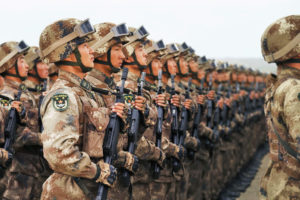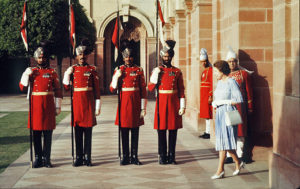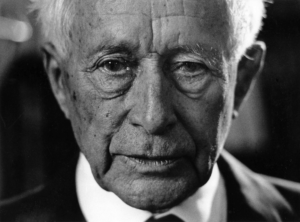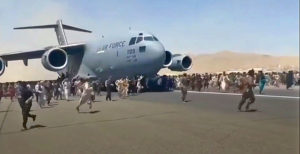How should we understand Britain’s colonial and imperial history? The 200th anniversary, this week, of the fictional birth of the great imperial anti-hero, Sir Harry Paget Flashman VC, is a timely way into the contested politics of historical memory. His adventures in George MacDonald Fraser’s Flashman Papers series have enthralled two generations of adventure-minded British men, yet lend themselves to a reading far more ambiguous than many assume.
The covers of the Flashman series are cultural artefacts in themselves: the image of the smirking anti-hero, sabre in hand, dressed up in his mid-Victorian cavalry finery or Oriental costume, an exotic conquest entwined around his legs, is firmly set against the cultural mood of the moment. The bullying villain of Thomas Hughes’ Tom Brown’s Schooldays, terror of the Rugby fags until his expulsion, Flashman’s unintentionally swashbuckling career can be understood as an earlier attempt to reckon with Britain’s imperial legacy.
From his first appearance in 1966, Fraser’s Flashman was a product of the same ironic Sixties craze for Victoriana as the Sergeant Pepper cover, or The Charge of the Light Brigade (1968), with which he overlaps in narrative and tone. The empire then was not as distant as it seems now: the brutal counterinsurgency campaigns in Kenya and Malaya were closer in time then than the Iraq War is to us, and the Aden insurgency was still ongoing. Fraser himself had fought the Japanese in Burma, and was commissioned as an officer in the Indian army less than 20 years before the first Flashman novel, one of the very last of generations of young British men to have done so.
A provincial grammar school boy, born in Carlisle to Scottish parents, Fraser’s family history was as intertwined with the fortunes of the empire as that of his creation, he would later note. “Well, the men will be going away again”, Fraser recalls his grandmother observing on the outbreak of war in 1939, adding that “her uncle had served in the Crimea, her brother had died in the Second Afghan, two of my aunts had lost sweethearts in the Great War, my father had been wounded in East Africa, and two uncles had been in the trenches; probably it was a not untypical record for a British family over a century”. Indeed, Fraser wore his dead great-uncle’s ring — “he’s buried somewhere in Afghanistan”, he notes — during his own active service in Burma.
“We saw the end of Empire, the very last of Kipling’s India”, Fraser would later write in his memoirs:
“The cool whitewashed interiors of the two-man rooms, one of which I shared with a Punjabi princeling, the soft-footed bearers fetching and carrying, the twinkling lance-points of the Mysore Lancers, gorgeous in their blue and gold and long-tailed puggarees as they rode from their barracks next door … It was the end of an old and glorious song, and I was lucky to be part of it.”
As for Enoch Powell, whose views on mass immigration he also shared, for Fraser the loss of India was as tragic a historical catastrophe as that of the Soviet Union is to Putin: the fading of a great imperial story, and the painful lived “experience of a country which passes in less than a lifetime from being the mightiest empire in history, governing a quarter of mankind, to being a feeble little offshore island whose so-called leaders have lost the will and the courage, indeed the ability, to govern at all”.
And yet the imperial story revealed in the Flashman Papers is far more ambivalent than the old writer’s final reminiscences would make it seem, so much so that it read on first publication as part of the great Sixties satire boom, undercutting the old British certainties with its taste for the hypocritical and sordid. In Flashman, the first novel of the series, the central character reveals himself as a bully, a coward and a rapist, who nevertheless finds himself lauded, following a series of picaresque misadventures, as the brave hero of Britain’s disastrous First Afghan War.
“Old Flashy, the bully and poltroon, cad and turncoat, lecher and toady” has little time for the moralism of his Victorian contemporaries, “who praise God on Sundays and sneak off to child-brothels during the week”, and whose self-denying imperial heroes are presented uniformly as a collection of fools, hypocrites and God-botherers. The empire’s red-coated defenders are merely “whoremongering, drunken clowns”, while Flashman’s own interest in the empire is purely limited to what he can extract from it. In a passage that could be lifted directly from some modern-day anti-colonial Guardian-fodder, he observes that:
“In India there was power — the power of the white man over the black — and power is a fine thing to have. Then there was ease, and time for any amount of sport, and good company, and none of the restrictions of home. You could live as you pleased, and lord it among the niggers … and there were as many women as you could wish for. There was money to be had, too, if you were lucky in your campaigns and knew how to look for it. In my whole service I never made half as much in pay as I got from India in loot — but that is another story.”
How do we reconcile the two: the caddish anti-hero who exposes the extractive brutality of imperial rule and the writer himself, an unreconstructed imperialist in love with the glory, colour and romance of Britain’s Eastern possessions? Reading Fraser’s two volumes of memoirs together with the Flashman series, the overlap between the fictional creation and the writer himself is instructive.
The Flashman universe is a clear working through of Fraser’s own wartime experiences, those of a provincial teenager suddenly thrust into a violent, romantic, alien world: “it is disconcerting to find yourself soldiering in an exotic Oriental country which is medieval in outlook, against a barbarian enemy given to burying prisoners up to the neck or hanging them by the heels for bayonet practice”.
Fraser’s own wartime memories — of bloody night-time battles in a Burmese forest, the execution of prisoners of war, the killing of a wounded Japanese soldier, all the fear and discomfort and confusion — are reworked in Flashman’s experiences of the Indian Mutiny and the Charge of the Light Brigade, and the great disaster at Kabul. All the experiences of battle, real and fictional, are written in the same disordered, impressionistic way, in dreamlike passages of literary high Modernism where sudden death and incongruous, hallucinatory scenes swim together in an old man’s fading memory.
The essential literary conceit of the Flashman novels is the unreliability of memory: vivid scenes are seared into the narrator’s memory (“I can still see before me” or “I will never forget” are phrases which run through both the novels and memoirs) even as the details pass into oblivion. The Flashman novels are, in essence, the disordered, heart-racing flashbacks of Britain’s own imperial memory.
And yet, behind the horror and the fear, the romance of adventure remains. The 40-year-old Fraser wrote the first Flashman novel while Deputy Editor of the Glasgow Herald, one of many from the wartime generation who, trapped behind a desk in middle age, would “throw aside his pencil and stare at the window and exclaim: ‘Oh, God, I wish the war was still on!’” Indeed, the inspiration for Flashman came to Fraser after a rare two-week embed with the Army fighting insurgents in Malaya and Borneo during the waning days of empire, where he had “got the smell of the Orient and soldiering again” and found the prospect of a return to office life too depressing to bear. “They have their hazards, but once you’ve trodden the wild ways you never quite get them out of your system.”
It worked: the Flashman series was a great success, removing Fraser from the newsroom and thrusting him into a world of literary success, and the financial comfort and foreign travel that came with Hollywood screenwriting. Writer of the Octopussy screenplay, Fraser effectively adapted the Bond formula to a Victorian imperial context, conjuring up a world of terrifying, eccentric villains who handily outline their dastardly plans to their trussed-up captive hero; of exotic beauties who give up their bodies in their hundreds for the lustful narrator’s use; of high adventure in romantic locales. Like Bond, the Flashman series is a product of the Sixties, a consoling myth of national derring-do at a period of catastrophic decline.
It is ironic, then, that the elderly Fraser would write so scornfully of “the children of the swinging Sixties” who created a society where “mis-called ‘Victorian values’ are derided, and the permissive society has turned a scornful back on so many things that my generation respected and even venerated”. As he noted sadly: “The tragedy is that when the floodgates are opened only slightly, and possibly with the best of intentions, it’s only a matter of time before they’re torn off their hinges by the torrent.”
Was there any self-awareness in Fraser’s jibe at “the diverting spectacle of those ultra-liberals who rejoiced at the Chatterley decision, pursing their lips and wondering if things haven’t gone a bit too far”? Perhaps, as with Sixties satirists such as John Cleese, the older writer looked back with loss at the passing world he had lampooned, and with guilty disgust at the world he had helped bring into being.
There seems a great disjunct, after all, between the ageing writer’s contempt for the “the interminable explicit sex scenes” of 2000s television and the actual contents of his published body of work. There is far more sex and violence in a Flashman novel than in even the most vulgar output of modern television, though it must be noted that Flashman’s sex life, all “getting my wench buckled to” and “rattling her six ways from Sunday” as “I romped her up and down” and “bulling away like fury” in a manner “like wrestling with a sergeant of dragoons” is far too cartoonish and strangely sexless to be erotic, like a higher-class version of Carry On Up the Khyber. The older Fraser gets, the more cartoonish the sex becomes, until by the time of 1994’s Flashman and the Angel of the Lord, when our anti-hero lies “collapsed supine beneath that ponderous mass of ebony flesh”, “rogering this prime piece of dusky blubber” and “belaboured by balloons of black jelly”, we find ourselves adrift in a world far beyond the erotic.
Reading Flashman today, his world — in which the easy libertinism of the Regency era was being replaced by thin-lipped, Victorian puritanism — seems oddly current. With an awareness of the horrors of war born from his own military service, and the cynicism of a senior journalist all too aware of how the sausage gets made, through Flashman Fraser expressed his contempt for the occasional bouts of war fever that excitable journalism awakens in the British public, with “the press promising swift and condign punishment for the Muscovite tyrant, and street-corner orators raving about how British steel would strike oppression down”.
As a downstream result of Fleet Street’s exertions, Fraser’s hero survives the Charge of the Light Brigade and finds himself chased by Russian soldiers on the road to Mariupol, observing that “the Russians fought as badly and stupidly as they nearly always do”, because “the Russian army was a useless thing, as we’d seen in the Crimea. You can’t make soldiers out of slaves”.
In the run-up to the American Civil War, Flashman finds himself forced to work with the idealistic abolitionist John Brown, who had “fuelled the passions of the wildest elements on both sides, and convinced even sensible and moderate people that the only answer was disunion and war”. In a country torn between two political factions who hated each other with visceral fury, divided on the politics of race, “he put gunsmoke on the breeze, and the whole of America breathed it in — and didn’t find the odour displeasing”.
Of Afghanistan, he observes, like many an editorial last summer, that “possibly there has been a greater shambles in the history of warfare than our withdrawal from Kabul; probably there has not. Even now, after a lifetime of consideration, I am at a loss for words to describe the superhuman stupidity, the truly monumental incompetence, and the bland blindness to reason” of Britain’s ignominious retreat, product of a Victorian bubble where “those who studied the country only from the cantonment at Kabul knew no more about it than you would learn about a strange house if you stayed in one room of it all the time”. Flashman’s world is not, after all, so very distant from our own.
Over time, the Flashman novels became a means for Fraser to process his own experiences of war, and loss and change, and to express his political and moral feelings with a complexity and ambiguity he was incapable of achieving in his memoirs: perhaps not intentionally, but simply because any writer, forced to churn out content regularly enough, ends up revealing more of himself than he intends. A craftsman rather than an artist, his successful formula is still very fine and entertaining handiwork, and the increasing sophistication of the historical footnotes Fraser appended to the novels emerges as the greatest joy of the series.
It is odd that the 2000s world of his memoirs seems further from us today than Flashman’s world did to him — many of his observations, commonplace then, would now be considered hate speech — and yet Flashman’s world of imperial misadventure still seems resonant, and strangely current. Like Flashman and his creator, we are trapped as unwilling protagonists in history, whose endless rhymes and recurrences cannot be escaped.
Disclaimer
Some of the posts we share are controversial and we do not necessarily agree with them in the whole extend. Sometimes we agree with the content or part of it but we do not agree with the narration or language. Nevertheless we find them somehow interesting, valuable and/or informative or we share them, because we strongly believe in freedom of speech, free press and journalism. We strongly encourage you to have a critical approach to all the content, do your own research and analysis to build your own opinion.
We would be glad to have your feedback.
Source: UnHerd Read the original article here: https://unherd.com





